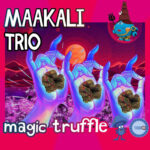As the U.S. Food and Drug Administration chews over approving psilocybin (from magic mushrooms) for the treatment of depression, a study from Emory University, the University of Wisconsin-Madison, and UC Berkeley has provided early estimates for the potential demand for the groundbreaking therapy.
The research, which was published in late September in the Journal of Psychedelic Pharmacology, proposed that between 5.1 and 5.6 million Americans who are currently being treated for depression could qualify for psilocybin-assisted therapy, should it receive FDA approval.
The study, a peer-reviewed and first-of-its-kind, analyzed national data on the prevalence of depression and its treatment, comparing it to the eligibility criteria used in recent clinical trials of psilocybin.
Study Predicts ‘Significant Demand’ for Psilocybin Therapy
The findings suggest that between 56% and 62% of patients currently receiving depression treatment in the U.S could be eligible for psilocybin therapy. This signals that there would be significant demand for the potential treatment.
The study’s lead author Syed Fayzan Rab said in a recent statement;
“Our findings suggest that if the FDA gives the green light, psilocybin-assisted therapy has the potential to help millions of Americans who suffer from depression,”
“This underscores the importance of understanding the practical realities of rolling out this novel treatment on a large scale.”

How Did The Researchers Make Their Projections?
The research team based their projections on the approximately 15 million U.S adults diagnosed with depression, 9 million of whom receive annual treatment. By analysing these individuals against the trial-based eligibility criterias, the researchers were able to generate a range of estimates.
The earliest psilocybin trials had the most stringent criteria. Under these guidelines, only 24% (around 2.6 million) of patients would qualify for psilocybin therapy. However, when criteria more likely to be used in real-world settings was applied, eligibility rose to 56%. Then, when even more factors were considered (such as the inclusion of those with alcohol and substance abuse disorders), the estimate increased to 62%. These inclusions would allow many more people the possibility of psilocybin treatment.
The Number is Likely Far Higher…
And, although this number may seem large, the researchers noted that these estimates were actually on the conservative side. This is because they only account for people already in treatment for depression, and does not include new patients who haven’t yet had or sought treatment.
Dr. Charles Raison, a co-author of the study and the lead investigator of one of the biggest clinical trials on psilocybin therapy for depression stated;
“While our analysis is a crucial first step, we’ve only scratched the surface in understanding the true public health impact psilocybin therapy may have,”
“Ultimately, the realizable potential of this treatment rests in the hands of regulatory bodies, policymakers, insurers, and the healthcare community at large.”
Potential Stumbling Blocks for Psilocybin Therapy
The researchers noted several factors that could be a stumbling block to a widespread adoption of psilocybin therapy. Firstly, FDA approval could be an issue — the FDA recently (bafflingly) rejected MDMA therapy for PTSD. Additionally, even if they did approve psilocybin therapy, they could make the parameters for eligibility small and unforgiving. After this, issues could arise to do with insurance coverage, access to properly trained practitioners, and regional differences in healthcare availability. Finally, if psilocybin were to be approved for off-label use for conditions other than depression, this could cause a huge, unprecedented surge in demand.

A Potentially Life-Changing Treatment
This study flags up the very real work that would need to be done if psilocybin were to be approved as a depression treatment. The psychedelic compound has been shown to have significant powers as a healing tool, seemingly able to treat the ‘untreatable’ conditions such as treatment resistant depression, eating disorders, addiction issues, and more. It is likely then, that many individuals would jump at the chance of a new and potentially life-changing treatment. Demand would be unprecedented
This means coming up with effective and reliable methods for the delivery of quality psilocybin-assisted therapy. As you may know, various states in the U.S have already decriminalized or legalized psilocybin for medical use (such as Orgegon in 2020 and Colorado in 2022). Since then other cities have decriminalized it too; however the U.S. as a whole has not yet allowed it for medical use, and will probably not do so until it receives FDA approval.

In the meantime, research into the benefit of the magic mushroom extract continues apace, with promising results published with growing frequency. For those who are not waiting for ‘official’ approval, using psilocybin via magic truffles, or magic mushroom grow kits, can be the key to both recreational and spiritually healing experiences.
Personal use of magic mushrooms, when done responsibly, can open up new worlds to those who believed they were stuck, and offer new inspiration for those wishing to make a change.





